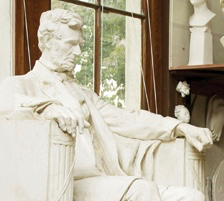|
“Who is an American?” Two public talks I attended this summer here in the Berkshires in Western Massachusetts addressed the question in two powerful ways. One brought a new perspective to what I thought I understood about the Founding Fathers and our founding documents. The other brought a voice from the past eerily to life as if he were talking about America today. The first was a talk given by Kermit Roosevelt, author, Professor of Law at the University of Pennsylvania’s Law School, and a great-great- grandson of President Theodore Roosevelt. What he had to say about our founding documents was chilling but hopeful at the same time. In this video, the noted constitutional scholar reveals the surprising fact that there are two constitutions – the much-vaunted document written by the Founding Fathers, and that which came about in the aftermath of the civil war, the so called “Reconstruction Constitution.” That modern American society operates essentially under the tenets of this later constitution, while most rhetoric sings the praises of the earlier document is of profound importance, and Professor Roosevelt explains why: Here's the TedxBerkshires talk. The second revelatory moment came with a performance called “Lincoln Speaks” in which the scholar Harold Holzer, along with professional actors, singers and local poo-bahs, raised Lincoln from the dead, reading his words from his private papers as well as from some of his most famous speeches. The event, first performed back in 2015 for the 150th anniversary of the end of the civil war, was reprised this summer at Chesterwood, in Daniel Chester French’s studio, where the sculptor created the iconic statue of Lincoln which sits in Washington, DC. The passage which most struck me that day was an excerpt from a letter he wrote to his friend Joshua Speed back in August 24, 1855: I am not a Know-Nothing. That is certain. How could I be? How can any one who abhors the oppression of negroes, be in favor or degrading classes of white people? Our progress in degeneracy appears to me to be pretty rapid. As a nation, we began by declaring that “all men are created equal.” We now practically read it “all men are created equal, except negroes.” When the Know-Nothings get control, it will read “all men are created equal, except negroes, and foreigners, and Catholics.” When it comes to this I should prefer emigrating to some country where they make no pretence of loving liberty - to Russia, for instance, where despotism can be taken pure, and without the base alloy of hypocracy [sic]. Mary will probably pass a day to two in Louisville in October. My kindest regards to Mrs. Speed. On the leading subject of this letter, I have more of her sympathy that I have of yours. And yet let me say I am Yours friend forever A. Lincoln So what can we conclude from these two examples? Do we revert to the Founding Fathers' document? Or do we stick to the one we have, Lincoln's version, and strive for a more perfect union, with justice for all.
1 Comment
4/1/2024 04:55:49 pm
In this essay, I'll explore the fascinating story of the American Founding Fathers, the fiery crucible of the Revolution, and the document that continues to shape our nation: the Constitution. We'll delve into the reasons for the revolution, the ideas that fueled the Founding Fathers, and the compromises they forged to create a lasting government. But the Constitution wasn't set in stone - we'll also examine how it has evolved through amendments, reflecting the ever-changing needs of the American people.
Reply
Leave a Reply. |
Setsuko WinchesterMy Yellow Bowl Project hopes to spur discussion around these questions: Who is an American? What does citizenship mean? How long do you have to be in the US to be considered a bonafide member of this group? Archives
June 2021
Categories |

 RSS Feed
RSS Feed